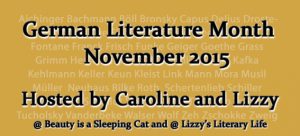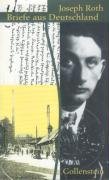This blog post is part of the German Literature Month, hosted by Lizzie (Lizzies Literary Life) and Caroline (Beauty is a Sleeping Cat)
Joseph Roth was not only the author of some of the most remarkable novels of his time, he was also a very prolific journalist who published hundreds of articles in newspapers. In the second half of the 1920s and early 1930s he worked mainly but not exclusively for the Frankfurter Zeitung, the leading liberal newspaper in Germany, one of the few papers that openly supported the Weimar Republic and that was known for its high quality journalism.
Roth was at the time when he worked for the Frankfurter Zeitung the allegedly highest paid journalist in Germany, if not Europe. He owed this not only to his reputation as a novelist but mainly to his brilliant article writing skills. Benno Reifenberg, the editor of the Frankfurter Zeitung made great efforts to keep Roth as a Sonderkorrespondent (special correspondent) in Paris even when that cost the paper who had already a regular correspondent in Paris a lot. Roth, who lived at that period without regular home in the best hotels earned plenty of money, but he spent it also immediately.
Considering the amount of publicist work and also the great qualities of these articles it is worth to read Roth’s journalism. It contains the same outstanding qualities as does his novelistic writing but it is a part of his work that is virtually unknown outside the German-speaking countries. A small collection of well-annotated articles Briefe aus Deutschland (Letters from Germany) is a good example of this part of Roth’s oeuvre. (Almost needless to repeat my mantra that there is no English translation yet.)
Between November 1927 and January 1928 Roth wrote a series of seven articles under the pseudonym Cuneus and published by the Frankfurter Zeitung under the title Letters from Germany. It describes Roth’s impression when he travelled to the Saargebiet, a part of Germany that was after WWI and the Versailles Treaty under a special legal regime. It had an international government formed by representatives of seven countries that was established by the League of Nations, the predecessor of the United Nations and monitored also by troops from many countries, and it was agreed that after a period of 15 years’ international control the citizens of the region should decide if they wanted to become part of Germany, of France, or if they would prolong the Status quo for another 15 years. In the meantime, the real important player in the Saar region was France.
The Saar, a mining and steal producing region was of strategic and economic importance for France and Germany as well and the French used the opportunity that Versailles created to detach this part of Germany that contributed heavily to the production of weapons at least temporarily from Germany and exploit its resources. That was the situation when Roth travelled to the region.
Roth makes a stop in Metz where he meets Hermann Wendel, a socialist German-French publicist and politician and he makes also the acquaintance of one of Wendel’s political adversaries. But his real target is a few kilometres behind the border: the Saar. Roth describes his impression of the city Saarbrücken (by the way my birthplace) after his arrival – the area around the Central Railway Station has changed, but not so much since Roth’s time; it is still an urbanistic mess – , he has a look into shops, talks with the traders, with people in coffee shops, restaurants and beer halls, he goes to the cinema (Murnau’s Faust which he didn’t like a lot), he joins the coal miners for a day and visits the steel factory in Neunkirchen, he attends a worker’s meeting where Alexandra Balabanoff, a Russian socialist and feminist is speaking, he is telling us the story behind the monument for “King” Stumm, the industrialist Carl Ferdinand Freiherr von Stumm-Halberg, who governed his steel factories and his workers very much like an absolutist king and more interesting things.
Roth is filtering the thousands of impressions he has during his trip and is turning them into descriptions that speak vividly of his abilities as a writer. No subject is too small as not to attract his attention, no remark anyone makes is too unimportant as not to put it into an interesting context. Sometimes it is as if we watch a novelist taking notes for his next book, it is all so well written and interesting although it was written for the day – and “the day” in this case was almost 90 years ago. But it is still very fresh thanks to Roth’s great gift as a writer.
A small example: while sitting in a café mainly frequented by not very wealthy people, Roth is watching some girl or young woman sitting alone at one of the tables. He is writing:
“Manches einsame Mädchen sitzt hier, schon sitzen gelassen oder noch nicht – und zwischen beiden Zuständen ist so wenig Unterschied! … Je länger ich die Frauen und Männer ansehe und vergleiche, desto grösser wird meine Angst, sie könnten sich ineinander verlieben. Wenn sie bald ein paar Männer herangezogen haben, die Mädchen, fang ich an zu weinen. Denn die Liebe könnte noch trauriger ausfallen als das Leben.“
„Some lonely girl is sitting here, already deserted, or not yet – and between both conditions there is so little difference! …The longer I look at the women and the men and compare, the bigger gets my fear that they might fall in love with each other. Soon when the girls have attracted a few men, I will start crying. Because that love could turn out even sadder than life.”
There are many paragraphs I would like to quote, but I will refrain myself with a second and final quote in which Roth is describing his surprise about the interest of people in literature and good books. After meeting a lawyer and later an owner of a department store both with a genuine interest in literature and art, he writes:
“Nirgends sah ich Bürger, deren Beruf es ist, Geld zu verdienen, so leidenschaftlich interessiert für Bücher, Wissenschaft, Kunst, Politik, mit so viel Begabung für Form und Manier und mit so viel Überlegenheit über jenen Matz, in dessen Zeitung sie inserieren müssen. … im Saargebiet treffen Sie noch Menschen, die sich um jede „Neuerscheinung“ kümmern und literarische Zeitschriften lesen, obwohl sie keine Literaten sind. Was mich betrifft, so habe ich zum ersten Male von Angesicht zu Angesicht Leser getroffen, denen ich in keinem Künstlerklub begegnet wäre. Es gibt noch Leser in Deutschland, die nicht schreiben.“
„Nowhere I saw citizens whose profession it is to earn money with such a passionate interest in books, science, art, politics, with so much talent for form and manner and with so much superiority compared to that fellow Matz (a local journalist who used this pseudonym to publish two articles that were denigrating Roth’s writing – T.H.), in whose newspaper they have to advertise…in the Saar you still meet people, who take care of each newly published book and who read literary journals although they are no literati. As for myself, I met for the first time face to face with readers that I could have never met in any artist’s club. There are still readers in Germany, that are not writing. (i.e. outside writers’ circles – T.H.)”
I am glad I read this book about my home region that is very carefully edited. It contains also photos, facsimiles of Roth’s articles and the two articles by “Matz” to which I was referring above, a letter of Roth to Benno Reifenberg and some excerpts from Roth’s diary of that period. An instructive essay by the Germanist Ralph Schock and additional annotations make this small book a real gem.
If you love Joseph Roth and read German, don’t miss his journalistic work; and why not to start with this well-edited small book?!
Joseph Roth: Briefe aus Deutschland, Gollenstein, Blieskastel 2008
The quotes by Joseph Roth are translated by Thomas Hübner
© Gollenstein Verlag, 2008 © Thomas Hübner and mytwostotinki.com, 2014-5. Unauthorized use and/or duplication of this material without expressed and written permission from this blog’s author and/or owner is strictly prohibited. Excerpts and links may be used, provided that full and clear credit is given to Thomas Hübner and mytwostotinki.com with appropriate and specific direction to the original content.





 Facebook
Facebook RSS
RSS Twitter
Twitter
Just published this month is Hotel Days, a collection of Roth’s journalism, translated by Michzel Hoffman. There is also in translations collections of his Berlin and Paris journalism. I totally agree about the brilliance of Roth. I enjoyed reading your post a lot.
Thanks a lot, Mel U, I am particularly glad for this information. So the situation regarding availability of his journalism in English is better than I thought – and Michael Hofmann is such a brilliant translator!
Pingback: German Literature Month V: Author Index | Lizzy's Literary Life
Pingback: German Literature Month 2015 – wrap-up | Mytwostotinki